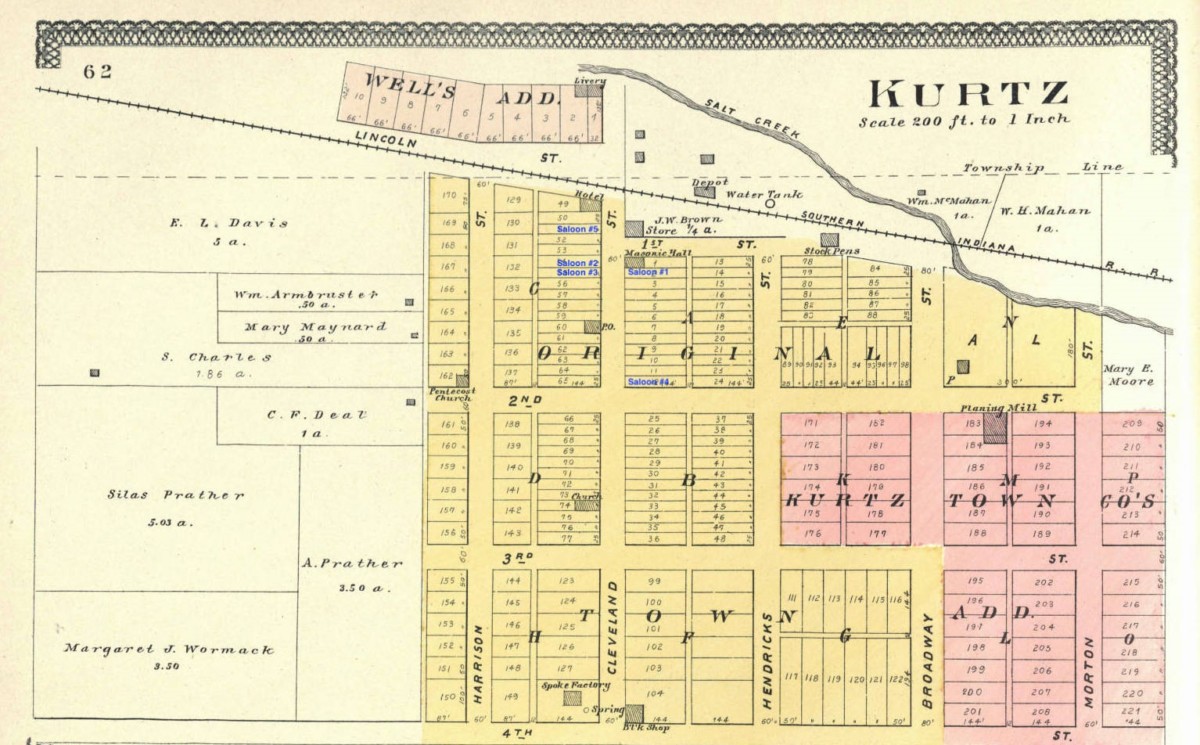
By Craig Davis
The period of 1900 to 1905 was characterized by a change in tactics by both sides of the saloon feuds in Owen Township.
To avoid the wearisome task of raising 250 signatures each time a saloonist applied for a license, prohibitionists tried using powers of attorney in place of signatures. When George H. Ferguson’s application was denied in 1900, he appealed. The circuit court reversed the decision, and Ferguson ran his saloon for a year until 1902 when the Supreme Court upheld the tactic.
The pro-saloonist Lane-Clampitt clan out of Norman also revised tactics. Days after a remonstrance defeated a saloon application in Kurtz submitted by William Lane, Frank’s father, prominent prohibitionist William Armbruster received an anonymous letter “in pencil in a fine feminine hand” that was chocked full of grammatical errors, threatening violence if the remonstrances did not cease.
“People down here is getting tired of the way you people are doing,” the letter read.
While the letter’s author is unknown, evidence suggests the Lane-Clampitt clan may have been responsible. Immediately after his father’s defeat, Frank himself had just submitted a fresh application that was pending review.
A Seymour Daily Republican article even alluded to Frank Lane’s complicity in the letter. Both Frank Lane and his father were illiterate, but Frank’s mother, Clarinda, a Clampitt by birth, could both read and write. It is not difficult to imagine Frank and his father standing over Clarinda’s shoulder dictating the letter.
The threatening letter, however, only served to unify opposition around 11 prominent prohibitionists, who published a response in two newspapers to “the mangy, cowardly cur, who has crawled under female attire to write this letter…”
The response was signed by William Armbruster, Howard Armbruster, James A. Kennedy, Charles C. Hutchinson, Charles Rentelspacher, William A. Smith, William H. Bower, Daniel W. Bower, C.E. Deal, J.R. Manual, William Moher and Elisha L. Davis.
Frank Lane’s application was denied as was his uncle’s, Enoch Clampitt, and his cousin’s, Richard Clampitt, that followed in quick succession in 1901. George H. Ferguson and John Frollic’s applications likewise failed in early 1902.
Frank Lane again tried a new plan of action by opening a saloon in Freetown with George M. Lucas in August 1902. Three months later, Lane’s uncle, Woodson Clampitt, finally succeeded in opening a saloon in Norman in October 1902. The temperance winds were shifting.
Then finally, after three dry years in Kurtz, Marshal Goen opened a saloon on the corner of Cleveland and Second streets in March1903 (see Saloon 4). Goen’s victory opened the floodgates.
“Marshal Goens opened up his saloon Tuesday of last week, and there is talk of two more for this place in the near future,” read the Brownstown Banner.
Enoch Clampitt opened a saloon on Lot 51 at the other end of Cleveland Street near the hotel across from the railroad tracks (see Saloon 5) in April 1903. Frank Lane wasted no time in moving back to Kurtz and keeping saloon, likely at his uncle Enoch’s establishment.
In December 1903, 35-year-old Frank Lane married 18-year-old Maude J. Fish, a first cousin to prohibitionist Landon Fish, which must have made for some lively family dinner conversation.
But Lane’s troubles did not end. In September 1904, Frank was acquitted of one charge of selling alcohol to a minor and fined $20 for the other. Frank finally decided to call it quits in Owen Township.
In October 1904, someone from Washington County moved to Kurtz and “bought Frank Lane’s interest in the saloon” because Frank was considering a permanent relocation to Oklahoma.
In light of these defeats, prohibitionists altered tactics again by recycling signatures from old petitions. In February 1905, anti-saloon advocates presented a remonstrance allegedly containing 296 names, but applicant John Reeves presented a document “which contained the names of 92 persons asking that their names be taken off of said remonstrance.”
The saloon feuds were far from over. They would continue for another 13 years.
Craig Davis, who was born in Seymour and graduated from Brownstown Central, currently lives in Tegucigalpa, Honduras, and works for a U.S. government contractor on school-based violence prevention. He is the author of “The Middle East for Dummies” and is conducting research for a genealogy and social history book in Kurtz and Freetown.
